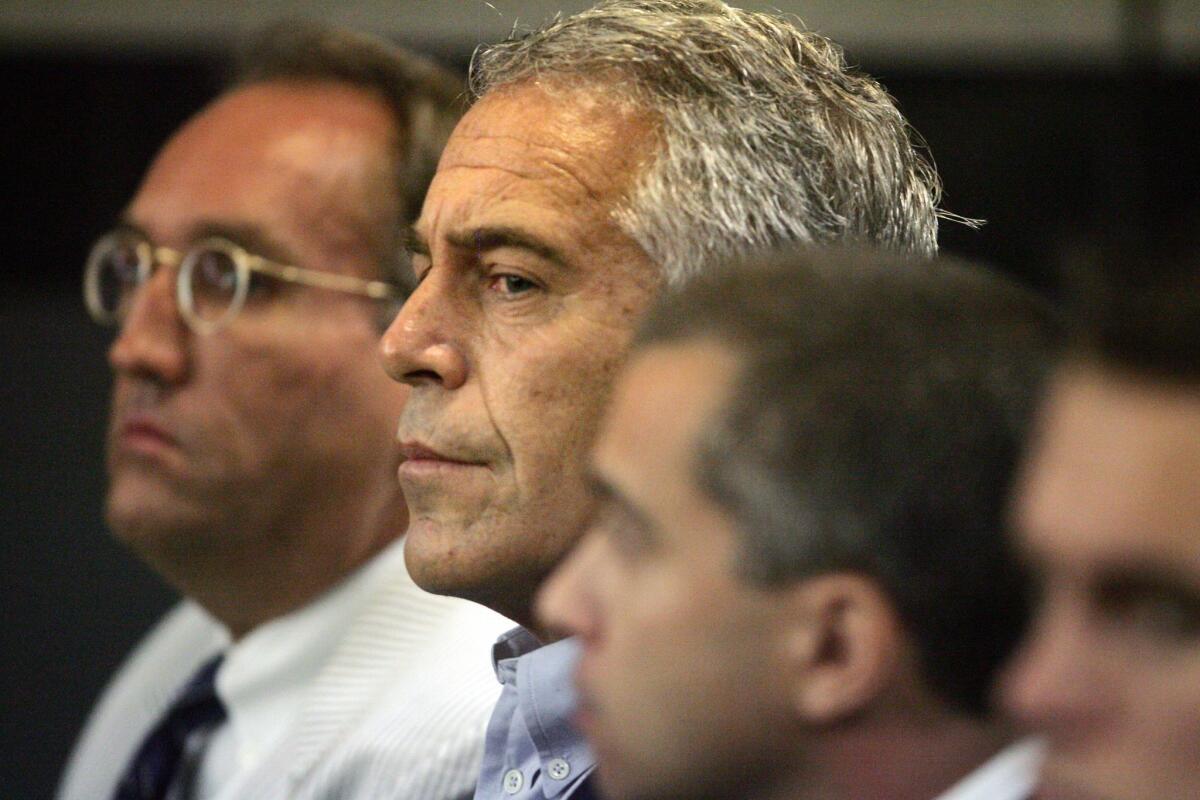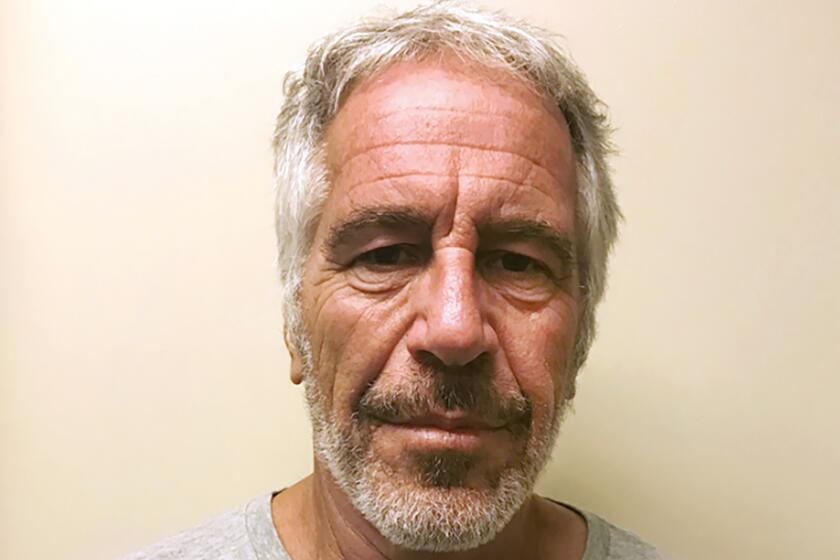Jeffrey Epstein dies by suicide; Barr orders investigation

- Share via
Jeffrey Epstein, the well-connected financier accused of orchestrating a sex-trafficking ring involving girls, had been taken off suicide watch before he died by suicide in a New York jail, a person familiar with the matter said Saturday.
He was found in his cell at the Manhattan Correctional Center on Saturday morning, according to the official, who was briefed on the matter but spoke on condition of anonymity because he wasn’t authorized to discuss it publicly.
U.S. Atty. Gen. William Barr said in a statement Saturday that he was “appalled” by news of Epstein’s death and had ordered an investigation by the inspector general. The FBI also is investigating, according to the Bureau of Prisons.
“I was appalled to learn that Jeffrey Epstein was found dead early this morning from an apparent suicide while in federal custody,” Barr said. “Mr. Epstein’s death raises serious questions that must be answered. In addition to the FBI’s investigation, I have consulted with the Inspector General who is opening an investigation into the circumstances of Mr. Epstein’s death.”
The Fire Department said it received a call at 6:39 a.m. Saturday that Epstein was in cardiac arrest, and he was pronounced dead at New York Presbyterian-Lower Manhattan Hospital.
The medical examiner’s office in Manhattan confirmed Epstein’s death.
A person familiar with the matter told the Associated Press that Epstein had been taken off suicide watch. The person wasn’t authorized to discuss the matter publicly and spoke to AP on condition of anonymity. It wasn’t immediately clear when he was taken off suicide watch.
Epstein’s arrest last month launched separate investigations into how authorities handled his case initially when similar charges were first brought against him in Florida more than a decade ago. U.S. Labor Secretary R. Alexander Acosta resigned last month after coming under fire for overseeing a plea deal when he was U.S. attorney in Miami.
The 66-year-old had pleaded not guilty and was facing up to 45 years in prison if convicted.
Last month, Epstein was found on the floor of his jail cell with bruises on his neck, according to a person familiar with the matter who spoke to the Associated Press on condition of anonymity. At the time, it was not clear whether the injuries were self-inflicted or from an assault.
The Bureau of Prisons confirmed that he had been housed in the jail’s Special Housing Unit, a heavily secured part of the facility that separates high-profile inmates from the general population. Until recently, the same unit had been home to the Mexican drug lord Joaquin “El Chapo” Guzman, who is now serving a life sentence at the so-called Supermax prison in Colorado.
Epstein’s death is likely to raise questions about how the Bureau of Prisons ensures the welfare of high-profile inmates. In October, Boston gangster James “Whitey” Bulger was killed in a federal prison in West Virginia where had just been transferred.
The Justice Department and the federal Bureau of Prisons did not immediately respond to requests for comment Saturday.

Cameron Lindsay, a former warden who ran three federal lockups, said the death represents “an unfortunate and shocking failure, if proven to be a suicide.”
“Unequivocally, he should have been on active suicide watch and, therefore, under direct and constant supervision,” Lindsay said. “When you have an inmate as high profile as Epstein, it’s absolutely imperative the warden set the tone with his or her leadership to ensure these kinds of incidents don’t happen.”
On Friday, more than 2,000 pages of documents were released related to a since-settled lawsuit against Epstein’s ex-girlfriend by Virginia Giuffre, one of Epstein’s accusers. The records contain graphic allegations against Epstein, as well as the transcript of a 2016 deposition of Epstein in which he repeatedly refused to answer questions to avoid incriminating himself.
Sigrid McCawley, Giuffre’s attorney, said Epstein’s suicide less than 24 hours after the documents were unsealed “is no coincidence.” McCawley called on federal authorities to continue their investigation, focusing on Epstein associates whom she said “participated [in] and facilitated Epstein’s horrifying sex trafficking scheme.”
“The reckoning of accountability begun by the voices of brave and truthful victims should not end with Jeffrey Epstein’s cowardly and shameful suicide,” McCawley said in a statement. “The victims await the true justice they have sought and deserve.”
Other accusers and their lawyers reacted to the news with frustration that the financier wouldn’t have to face them in court.
“We have to live with the scars of his actions for the rest of our lives, while he will never face the consequences of the crimes he committed the pain and trauma he caused so many people,” accuser Jennifer Araoz said in a statement.
Brad Edwards, a Florida lawyer for nearly two dozen other accusers, said that “this is not the ending anyone was looking for.”
“The victims deserved to see Epstein held accountable, and he owed it to everyone he hurt to accept responsibility for all of the pain he caused,” Edwards said in a statement.
The retail titan behind Victoria’s Secret says the financier Jeffrey Epstein misappropriated “vast sums” of his fortune while managing his personal finances.
Epstein’s arrest drew national attention, particularly focusing on a deal that allowed Epstein to plead guilty in 2008 to soliciting a minor for prostitution in Florida and avoid more serious federal charges.
Federal prosecutors in New York reopened the probe after investigative reporting by the Miami Herald stirred outrage over that plea bargain.
But his lawyers maintained that the new charges brought by federal prosecutors in New York were covered by the deal and were improper.
They said he hadn’t had any illicit contact with underage girls since serving his 13-month sentence in Florida.
Before his legal troubles, Epstein led a life of extraordinary luxury that drew powerful people into his orbit.
He socialized with princes and presidents and lived on a 100-acre private island in the Caribbean and in one of the biggest mansions in New York. A college dropout, he became a sought-after benefactor of professors and scientists, donating millions of dollars in donations to Harvard University and other causes.
Still, it was never entirely clear how the middle-class Brooklyn math whiz became a Wall Street master of high finance.
From the harbor on St.
The somewhat reclusive Epstein splashed into the news in 2002 after a New York tabloid reported he had lent his Boeing 727 to ferry former President Bill Clinton and other notables on an AIDS relief mission to Africa.
Magazine profiles followed and established Epstein’s reputation as a stealthy yet exorbitantly successful money man with a gilded social circle and a somewhat ascetic streak.
Vanity Fair in 2003 described him entertaining real estate tycoons, business executives and the scions of some of America’s wealthiest families at his New York mansion — while also spending 75 minutes a day practicing yoga with a personal instructor and eschewing email, alcohol, tobacco and drugs.
His friends over the years have included Donald Trump, Britain’s Prince Andrew and former Harvard law professor Alan Dershowitz.
But Epstein also enjoyed surrounding himself with women much younger than he, including Russian models who attended his cocktail parties and women he flew aboard his plane, according to the Vanity Fair profile.
More to Read
Sign up for Essential California
The most important California stories and recommendations in your inbox every morning.
You may occasionally receive promotional content from the Los Angeles Times.















